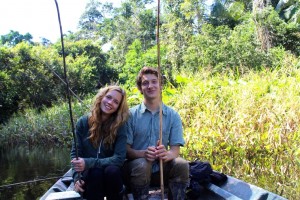Want to watch an interview with 2015 AC Ambassador Corps participant Izzy Flemming? Click here!
We always enjoy chatting with Nick Zelle, one of our stellar Ambassador Corps Students from our summer 2015 pilot cohort. Now back at Middlebury College in Vermont, Nick reflects on his experience in Peru:
Name: Nicholas Andruss Zelle
Citizenship: US
Current title: Student at Middlebury College
Dream occupation or job title: I am interested in the intersection of arts and social change, especially given my background as a professional circus artist. My ideal job would include writing and storytelling, strategic planning and social outreach.
Why did you decide to join the Ambassador Corps (AC) program?
I applied to the Ambassador Corps (AC) program because I wanted an immersive work experience abroad. I was also very interested in learning more about the social entrepreneurship field. Furthermore, I was excited about being put in a foreign situation, with a unique set of challenges – both in sense of those that belong to the local community and in the ways that an NGO engages with those challenges in a responsible way. I knew that the AC program offered a unique opportunity to do meaningful work with an NGO.
What were you hoping to get out the experience?
In part, I was hoping to gain certain practical skills and know-how in working with an NGO. Mostly I wanted to understand the social entrepreneurship field better and see what parts of it most resonate with me so as to concretely decide what I want to do in the future.
What was a typical day like during your AC internship?
A typical day was spent at the Andean Alliance for Sustainable Development (AASD) office, working in collaboration with Evelin and Adam to accomplish the goals we had set for ourselves that week for our overall project. For example, one week we focused on researching experiential learning programs both at Middlebury and other institutions in order to better understand how a potential student research program could best meet the needs of students and the host organization. We used this perspective later when we designed and refined or original experiential learning programs with the AASD for Middlebury students. At the end of the day, we’d walk back down to our homestay, usually stopping at the Churro vender on the way, and we would spend the rest of the evening with our host family.
Were there any surprises or unforeseen benefits that emerged?
I was pleasantly surprised by the culture of the organization which was very critical of sustainability and community development practices. Before working with AASD, I was unsure of how to think about the ethics of NGO intervention in community issues and how it could engender positive social change without a patriarchal approach to working with the community. After my experience, I’m so happy to say that I have seen first hand how NGO intervention can be navigated responsibly and to have been surrounded by people who think so deeply about the meaning of their work.
What were some of your biggest obstacles during the experience – professional or personal?
There were many micro-challenges as we tried to figure out the best way to move forward with our project. It was sometimes necessary to just trust the process and know that the uncertainty of what we were doing would eventually give way to really great results.
Describe someone you met during the program that had a major impact on your experience.
Spending time with my host family was one of the most important aspects of my experience in Peru. There was a considerable language barrier (I had spent three weeks teaching myself Spanish before arriving, and among the handful of words they knew in English were such important ones as “I am,” “fork” and “Fakir” , which made little sense when strung together). Despite our difficulties communicating verbally, we spent many evenings over dinner or games laughing and talking about Peru, their work and lives and more. We even had the chance to follow them one day to the school where they teach. After weeks of hearing them talk about their students and the challenges with education in the region, it was incredible to see them in their element.
How would you describe AC to a stranger?
AC is a highly individualized experiential learning program that allows students to immerse themselves in meaningful work with an organization in the social entrepreneurship field abroad.
Did AC change or pivot your path? If so, how?
The experience certainly broadened my perspective and made me think more critically about the social entrepreneurship field and the type of work I’m considering. I already intended to work in the social impact sector before embarking on AC, and this summer has confirmed that decision.
Describe the AC experience in 5 words.
Immersive, individualized, formative, challenging, unique
What are some of the biggest challenges in growing the impact-driven economy?
We can’t move along a community development project at a pace faster than that at which the community functions. This is to say that sustainable social change cannot be top-down directed, so a successful impact-driven economy would need to be patient. Another challenge is that people (including social entrepreneurs) often identify the weaknesses of a given community, rather than focusing on and harnessing its strengths; as a result, there is this attitude that outside aid can be “the solution”. While it’s well intended, I think this mentality can be detrimental. Capitalism works in opposition to an idyllic, community-accountable economy, so we would need to abandon greed and a self-satisfying mentality that we are able to fix (others’) problems quickly.
What’s next for you?
I feel very motivated to tie this experience into my studies and life at Middlebury in some way. I think it will greatly dictate the way I mentally approach all future academic and professional endeavors, especially relating to development work or work oriented around community wellbeing.
Connect with Andean Alliance Website Facebook Twitter
Connect with Ambassador Corps and join our next cohort: ambcorps@miis.edu
Connect with CSIL: Newsletter Twitter Facebook

